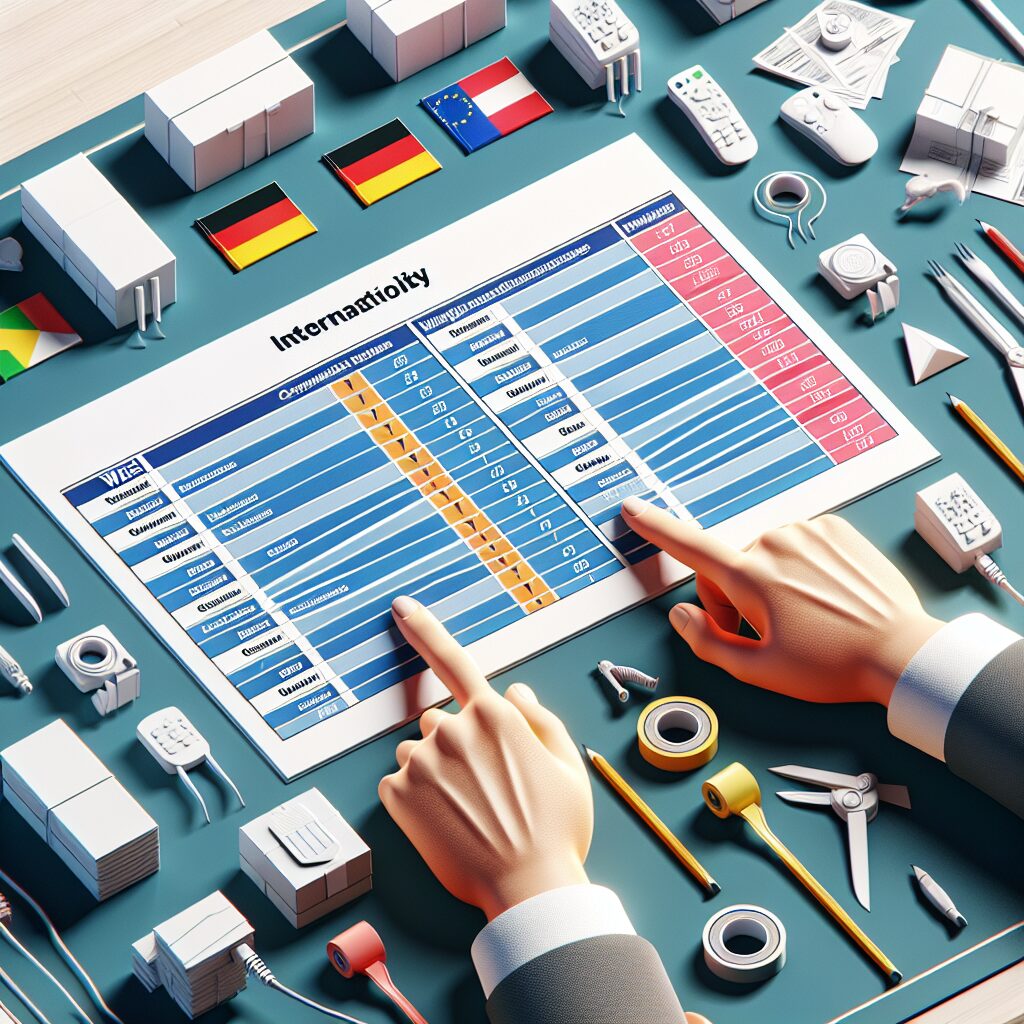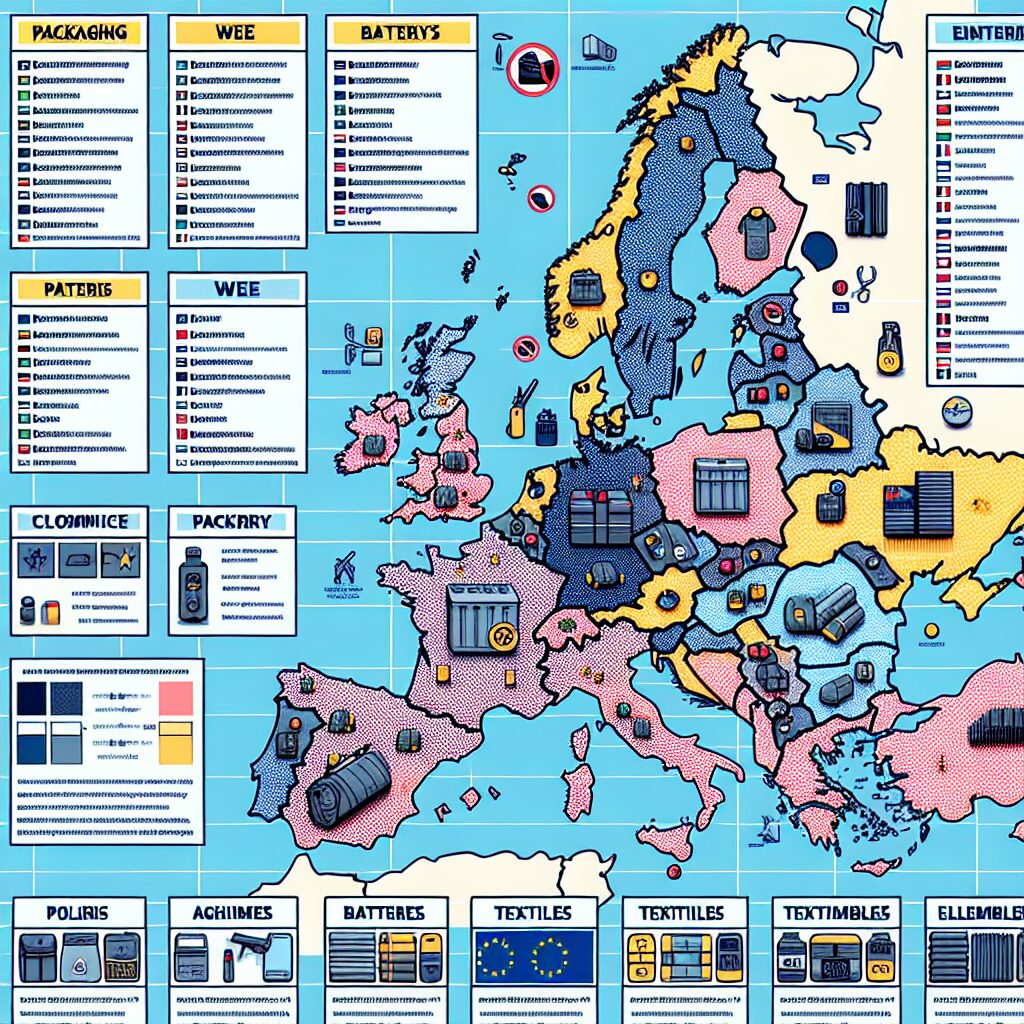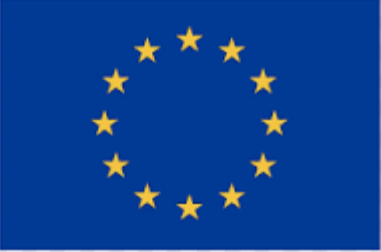About eldris
epr.eldris.ai leads the EPR sector, in fast, automated, AI Agent EU Complaince. LUCID Packaging, WEEE, and Battery Compliance for Brands, E-Commerce and Service based businesses expanding into the EU.
In This Article
- Use accurate Triman plus Info-Tri files on all relevant packaging sold in France.
- Register with a Producer Responsibility Organisation and retain your UIN.
- Display digital Info-Tri links only when physical space limits application.
- Monitor Amazon and EU marketplace dashboards for warning flags or takedowns.
- Automate compliance workflows with a dedicated platform like Eldris.
Understanding France’s EPR Labeling Framework
Why Triman and Info-Tri Matter in 2025
France EPR Labeling regulations have become a cornerstone of French environmental policy as part of the country’s broader sustainability legislation. EPR, or Extended Producer Responsibility, mandates that producers of certain categories of goods—particularly packaging, textiles, and electronic equipment—take responsibility for the end-of-life management of their products. Under this framework, compliance with Triman and Info-Tri labelling has become mandatory for a broad range of items sold online and in physical retail.
From 2025 onwards, enforcement of France EPR Labeling will tighten considerably. Online sellers, regardless of whether they are based in France, must include the correct Triman label along with accompanying Info-Tri instructions on product packaging. The goal is to communicate recyclable status and precise disposal methods to French consumers. Non-compliance doesn’t just risk regulatory fines; it also leads to takedowns from major online marketplaces such as Amazon, Cdiscount, and Rakuten. Platforms are increasingly quick to remove listings that lack proper environmental compliance.
[PART_1_CONTENT]

What is the Triman Label and Its Legal Use
Required Design and Placement Rules
The Triman label is a mandatory French environmental mark indicating that a product is subject to extended producer responsibility and must be sorted for recycling. It consists of a recognisable pictogram showing a human disposing of waste, usually next to the recycling container. Since 2022, the use of the Triman logo alongside the Info-Tri sorting instructions has been required, and compliance audits now focus on both.
To comply with France EPR Labeling, the Triman symbol must be permanently affixed to product packaging, user manuals, or directly on the product itself if applicable. Importantly, it cannot be obscured by additional labelling or marketing elements. The placement should be prominent and legible. The required size typically equals a minimum width of 6mm, and colour contrast must ensure visual clarity. Sellers should always verify the latest updates from ADEME, France’s EPR oversight body.
[PART_2_CONTENT]
Info-Tri: Product Sorting Guidance
How Ecommerce Sellers Must Use It
Info-Tri provides consumers with the sorting instructions specific to each product component covered under EPR guidelines. These details explain which materials go into which bins—plastic, cardboard, metal, or glass—and are vital to effective recycling. According to France’s Info-Tri rules, display of this information is compulsory alongside the Triman logo, in French, even if the product is sold online from outside France.
For online sellers, Info-Tri requirements present unique challenges. Multicomponent products often contain various materials needing different disposal approaches. Sellers must assess the main product body, film wrap, padding inserts, and external packaging separately. The Info-Tri symbols must be precise and authorised by PROs (Producer Responsibility Organisations), usually provided as part of their compliance support. Crucially, general “recyclable” claims are insufficient—compliance depends on displaying the exact disposal route according to the French waste system.
[PART_3_CONTENT]
Packaging Sizes and Labeling Exceptions
What Sellers Can Display Digitally
While physical labelling is the norm under France EPR Labeling, there are notable exceptions based on packaging dimensions and physical limitations. For example, products with limited surface area—such as cosmetics or medical devices—may be exempt from physical Info-Tri display. In such cases, the labelling information may instead be published digitally, for instance, on a dedicated French-language webpage accessible via QR code or hyperlink.
This exception, however, requires that the digital link be active, free from tracking, and accessible on the packaging itself. The QR code or short URL must redirect directly to the proper Info-Tri guidance specific to the product’s components. Blanket links to a generic homepage will not satisfy the regulation. Online sellers are urged to maintain a product-specific digital index of Info-Tri images to stay prepared during marketplace audits or government checks.
[PART_4_CONTENT]
EPR Enforcement: Fines and Listing Risks
Amazon and EU Marketplace Consequences
Mislabeling or failure to display France EPR Labeling can lead to substantial fines imposed by French authorities, ranging between €15,000 and €100,000 depending on the nature and scale of the violation. But more pressing for ecommerce sellers are the automated sanctions from marketplaces like Amazon, eBay, and Zalando. These platforms now employ environmental compliance algorithms that flag listings lacking verified Triman and Info-Tri markings.
Amazon’s EPR dashboard tracks seller participation across applicable waste streams and regularly notifies vendors of missing documentation. Listings may be suppressed, accounts suspended, or penalties applied if registration numbers, labels, or digital declarations are omitted. Third-party seller data indicates that non-compliance warnings are often triggered within days after ASIN creation. This makes proactive labelling preparation essential. Learn more about EU Packaging & EPR Compliance for Sellers
[PART_5_CONTENT]
Checklist: Staying Compliant in France
Practical Labeling Actions for Sellers
To ensure you remain compliant under France EPR Labeling laws, sellers must develop an operational labelling workflow integrated with packaging design, manufacturer instructions, and product content uploads. Here’s a step-by-step checklist designed for ecommerce operations:
- Identify if your products fall under France EPR categories (e.g., packaging, textiles, electronics, furniture).
- Register with the appropriate French Producer Responsibility Organisation(s), such as CITEO or Eco-Mobilier.
- Obtain your Unique Identifier Number (UIN); this must be displayed during marketplace registration.
- Work with your supplier or packaging team to design compliant Triman and Info-Tri files in French.
- Apply the label to packaging, product literature, or digitally via QR code if exempt.
- Ensure submitted listings on marketplaces include accurate EPR documentation and access to digital Info-Tri.
- Monitor each ASIN or listing monthly for compliance notifications or recurrence of issues.
[PART_6_CONTENT]
Triman + Info-Tri Examples for Common Products
Visual Use Cases and Ecommerce Packaging
Understanding how France EPR Labeling works in practice requires reviewing real-life labelling implementations. Below are common ecommerce product examples and how Triman and Info-Tri apply to their packaging:
- Cosmetics Gift Box: Triman + Info-Tri on outer carton; digital label via QR for internal tray.
- Smartphone in Box: Triman issued on instructions manual; Info-Tri for plastic film shown digitally due to small parts.
- T-shirt Packaged in Polybag: Triman printed on label tag; Info-Tri as pictogram on the bag.
- Kitchen Blender: Triman and Info-Tri on carton; detachable cable shown with separate disposal instructions.
Visual consistency is crucial. Use authorised templates provided by your PRO and avoid altering the proportions or removing the sorting text. Consider batch reviews with compliance experts to validate new seasonal designs. Read a related article
[PART_7_CONTENT]
Toolkits and Support for Online Sellers
How Eldris Helps Automate EU Packaging Compliance
Meeting ongoing France EPR Labeling requirements can strain online sellers, especially those managing multi-platform catalogues and international shipments. Eldris offers a robust suite of compliance tools that simplify labelling management, automate EPR registration, and match the correct Triman and Info-Tri rules per product level. The platform assists merchants in generating digital label repositories and submitting proof-of-compliance reports to marketplaces.
In addition, Eldris regularly updates regulatory data sourced from ADEME and other French authorities, ensuring clients remain compliant as laws evolve. Dedicated support teams also offer consultancy to determine suitable PRO partners, apply for Unique Identifier Numbers, and conduct packaging audits tailored to the French market. Whether you’re a solopreneur on Etsy or a major Amazon vendor, Eldris can integrate with your listing system to prevent deactivations and improve your eco-responsibility footprint efficiently. How eldris streamlines EU Responsible Person setup
[PART_8_CONTENT]
Additional Links for France EPR Compliance
Where to Learn More
To deepen your understanding of France EPR Labeling and stay ahead of legislative developments, consider these key resources:
- ADEME – French Environment & Energy Management Agency: Official publications and legal texts on EPR waste streams and Triman guidance.
- CITEO: Main PRO for packaging waste. Offers label files, tutorials, and registration portals.
- France’s Official Packaging Obligations Page: Includes an overview of obligations by product category.
- E-commerce Marketplace Portals: Amazon Seller Central and others provide EPR dashboards and document upload features under “Sustainability” tabs.
Bookmark these destinations and stay subscribed to industry news and webinars provided by trusted compliance platforms such as Eldris and Circular Compliance. Staying informed is your first step to avoiding regulatory pitfalls and to building a sustainable, legally sound online business in France.
[PART_9_CONTENT]
“Accurate implementation of Triman and Info-Tri labels is no longer optional — it’s critical for every seller targeting the French market.”
Conclusion: Master Triman, Avoid EPR Penalties
France EPR Labeling is more than a sustainability initiative—it’s a legal imperative for anyone selling in the French market. With increasing marketplace oversight and government scrutiny, neglecting Triman or Info-Tri elements could lead to hefty fines, damaged reputations, and suspended listings. Sellers must take proactive steps: understand the categories they fall under, display appropriate labelling, and seek automation through qualified platforms like Eldris.
As 2025 approaches, leading sellers will stand apart by mastering the intricacies of EPR compliance, not merely avoiding penalties but also building customer trust and brand responsibility. [TAKEAWAY_BULLETS]
Great guide on france-epr-labels-triman-info-tri-and-online-seller-risks-incorrect-triman-or-info-tri-labeling-exposes-online-sellers-to-listing-removals-and-fines-this-authoritative-guide-explains-correct-la – Community Feedback
What is the Triman label in France?
The Triman label indicates to consumers that products and packaging can be recycled and separates out components for proper sorting. The newer Info-Tri symbol expands on this by giving detailed sorting instructions for each product category.
What are the exceptions to the Triman logo?
Exceptions exist for displaying the Triman logo and sorting information. If the largest side of a product or its packaging is between 10 and 20 cm², the sorting information may be shown digitally, but the Triman logo is still mandatory.
What is triman?
The Triman logo is a pictogram of a person with an outstretched arm and three arrows, symbolizing the circular economy and instructing environmentally conscious citizens to recycle products and packaging appropriately.
Does BAC de Tri mean recycle?
“Bac de tri” means the recycling bin for all recyclable waste, usually yellow in France. It collects plastics, jars, trays, metals, paper, and cardboard boxes.










